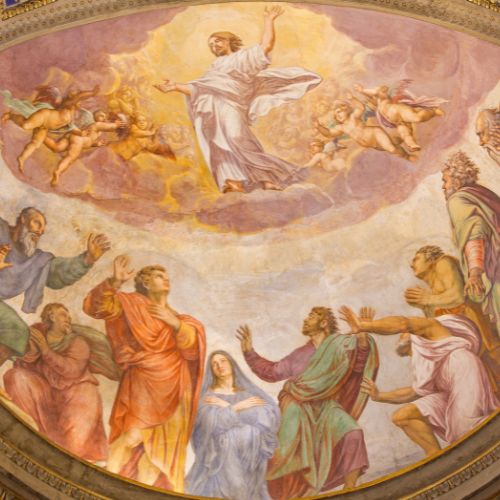Throughout history, humans have been fascinated by the concept of an afterlife. Many believe that after death, they will either ascend to a beautiful paradise or descend into a fiery abyss. The idea of heaven and hell has been central to various religious beliefs and cultural traditions, with different interpretations of their nature and purpose. Some believe that heaven is a place of eternal bliss and peace, while others envision hell as a realm of torment and punishment. The idea of an afterlife raises profound questions about the purpose and meaning of life and the possibility of redemption. The judgment of God is seen as a pivotal moment in determining one's eternal fate, with the hope of eternal life serving as a source of comfort and inspiration for many. In this article, we will explore the nature of heaven and hell, the afterlife, the judgment of God, and the hope of eternal life.
The Nature of Heaven
The nature of heaven is a concept that has captured the imaginations of people for centuries. In many religious traditions, heaven is seen as a place of ultimate joy and peace, where one can be reunited with loved ones who have passed away. It is often described as a place of eternal rest, where the soul can be free from the burdens and sufferings of the physical world.
The nature of heaven varies between different religions and belief systems. For Christians, heaven is often seen as a place where believers can be in the presence of God and live in perfect harmony with Him. In Islam, heaven is described as a beautiful garden filled with streams, fruits, and lush vegetation. In Hinduism, heaven is referred to as Swarga, a realm of pleasure and happiness that is enjoyed by the gods.
Despite the differences in beliefs about the nature of heaven, there is a common thread that runs through all of them – the idea of a perfect and blissful existence, free from pain, sorrow, and suffering. For many, the hope of attaining heaven provides comfort and inspiration, serving as a source of motivation to lead a virtuous and righteous life.
The Nature of Hell
For centuries, the idea of hell has captivated the human imagination. From Dante's Inferno to modern horror movies, the concept of a place of eternal punishment has been portrayed in countless works of art and literature. But what exactly is the nature of hell?
Across various cultures and religions, hell is typically portrayed as a place of punishment for those who have committed evil deeds or have not lived according to certain moral standards. While the specifics vary, the general consensus is that hell is a place of suffering and torment.
Some argue that hell is a physical place of fiery punishment, while others suggest that it is a psychological state of suffering and regret. Regardless of the interpretation, the concept of hell raises important questions about morality, justice, and the afterlife.
For many, the fear of eternal damnation is a powerful motivator for living a moral and ethical life. The idea that one's actions in this life have eternal consequences is a sobering reminder of the importance of making ethical choices.
However, others reject the idea of hell altogether and focus on living a good life for its own sake. For them, the pursuit of virtue and the cultivation of meaningful relationships are their own rewards.
Ultimately, the nature of hell is a complex and multifaceted subject that is shaped by a variety of cultural, religious, and philosophical influences. While we may never know for certain what happens after death, the concept of hell reminds us that our actions have consequences and that the pursuit of virtue is a worthwhile endeavor.
The Afterlife
Throughout history, the notion of an afterlife has captivated people's imagination, with numerous individuals believing in the existence of a realm beyond the physical world.The idea of the afterlife varies greatly between different religions and belief systems, but the common thread is that there is something beyond death.
For many, the afterlife is seen as a continuation of the soul's journey, where it either ascends to a higher plane of existence or descends into a realm of punishment. In some belief systems, the afterlife is seen as a place where the soul can be reunited with loved ones who have passed away, while in others, it is a solitary journey towards enlightenment and spiritual growth.
The concept of the afterlife has been a source of comfort and inspiration for many, as it provides the hope that death is not the end and that there is a purpose and meaning to life beyond the physical realm. The idea of the afterlife has also served as a motivation for many to live a virtuous and righteous life, with the belief that their actions in this life will determine their fate in the next.
Despite the many differences in beliefs about the afterlife, it remains a fascinating and mysterious concept that has captivated the human imagination for centuries.
The Judgment of God
The idea of a divine judgment has been a prominent theme in many religions and cultures throughout history. From the ancient Egyptians' weighing of the heart to the Greek myth of the three judges of the underworld, the concept of judgment has taken many forms. But what does it mean to be judged by a higher power?
Regardless of the specific interpretation, the concept of divine judgment raises important questions about morality, accountability, and the afterlife. For some, the idea of a divine judgment is a comforting thought, as it suggests that there is a higher power that will hold people accountable for their actions.
However, for others, the idea of a divine judgment is a source of fear and anxiety. The fear of being judged and found wanting can be a powerful motivator for living a moral and ethical life, but it can also lead to a sense of guilt and shame.
Ultimately, the judgment of God is a complex and multifaceted subject that is shaped by a variety of cultural, religious, and philosophical influences. While the specifics of divine judgment may vary, the underlying themes of accountability, morality, and the afterlife are universal.
Whether we believe in a divine judgment or not, the concept of being held accountable for our actions is a powerful reminder of the importance of living a life that is guided by compassion, empathy, and moral principles. As we navigate the complexities of the world around us, it is up to us to make ethical choices and strive to be the best versions of ourselves that we can be.
The Hope of Eternal Life
The idea of eternal life is one that has captivated the human imagination for centuries. From the ancient Egyptians' belief in the afterlife to modern-day discussions of transhumanism and the singularity, the hope of living forever has been a constant theme in human culture.
For many, the hope of eternal life is a source of comfort and inspiration. The belief that our consciousness will continue beyond our physical bodies can help us to cope with the inevitability of death and find meaning in our lives.
However, the concept of eternal life raises important questions about what it means to be human. If we were to achieve immortality through technological means, for example, would we still be the same people that we are today? Would we still be capable of experiencing the full range of human emotions and sensations?
Despite these complexities, the hope of eternal life remains a powerful motivator for many people. Whether we believe in an afterlife, the possibility of transhumanism, or simply the enduring impact that we can have on the world around us, the idea of living forever reminds us of the preciousness of life and the importance of making the most of the time that we have.
Ultimately, the hope of eternal life is a complex and multifaceted subject that is shaped by a variety of cultural, religious, and philosophical influences. While the specifics of what eternal life may look like may vary, the underlying themes of mortality, meaning, and purpose are universal. As we navigate the complexities of our lives, the hope of eternal life can serve as a powerful reminder of the importance of making ethical choices and striving to make a positive impact on the world around us.
In Conclusion
the topics of heaven, hell, divine judgment, and eternal life are complex and multifaceted subjects that have captured the human imagination for centuries. Whether we believe in these concepts or not, they raise important questions about morality, accountability, and the meaning of life.
The nature of heaven and hell, the judgment of God, and the hope of eternal life are all shaped by a variety of cultural, religious, and philosophical influences. While the specifics may vary, the underlying themes of morality, accountability, and the importance of living a meaningful life are universal.
Ultimately, these topics remind us of the preciousness of life and the importance of making ethical choices. Whether we believe in an afterlife or not, the pursuit of virtue and the cultivation of meaningful relationships are their own rewards. As we navigate the complexities of our lives, these topics can serve as powerful reminders of the importance of making the most of the time that we have and striving to make a positive impact on the world around us.



